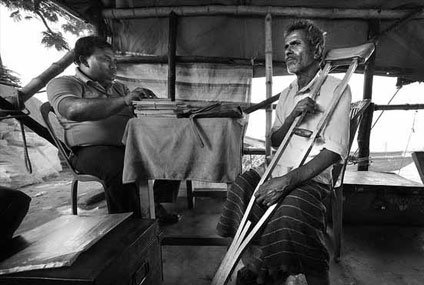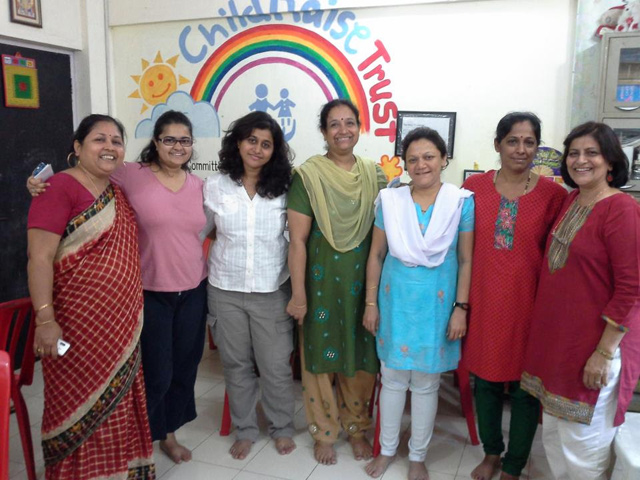Quick Links
Chai with Laxmi - Information for Inclusion
"Growing up, I'd never had any seizures. The first time it happened was at the delivery room. Before that, I'd never had any," says Kavita.
However, despite having survived this ordeal Kavita continued to suffer with seizures from time to time. "I soon realized that I was lucky, I was financially comfortable and surrounded by people who were supportive and aware of my condition. But that's not the case for everyone," says Kavita Shanbhag. It was whilst delivering her eldest daughter that Kavita suffered her first seizure. This was the result of a condition known as Eclampsia, which is a complication that occurs during pregnancy. Here the seizures can result in placental bleed and eruption, or coma for the mother.
In urban India, only 40 percent of its people seek necessary treatment for disabilities. In rural parts of India its 10 percent. The remaining – are left in ignorance due to the unavailability of information and misconceptions that are propagated by society. Given little to no information available on how to cope with disabilities or provide adequate care for people with special needs, Kavita decided to start ChildRaise Trust in 2001 on December 3rd - World Disability Day.
Based in Mumbai, ChildRaise is an organization that is helping both the disabled and their caregivers by making information available. They also provide a support system through a helpline and drop-in centers. The organisation has even published a guide for parents and people with special needs; this is titled: Resource Guide – journey to empowerment, road-map for special needs children.
There are over 70 million people with disabilities and over 30 lakh children with special needs in India. The term disability here ranges from physical disabilities such as visual, hearing or orthopedic to developmental disorders such as epilepsy and cerebral palsy.

It is estimated that 95 percent of children with epilepsy do not get adequate treatment. Instead, generic medication is provided, which does not help the individual, as epilepsy and its triggers and medication are all individual specific. With the public sector facing a shortage of 50 percent in medication for Epilepsy alone, it is clear that not all 14 of every 1000 persons with epilepsy in India have the same access to the required medication. This little access coupled with social stigmatisation has caused widespread social misconception and little awareness on accurate treatments that suit the patient best.
All of these things contribute to and exaggerate the existing problem of exclusion of people with disability.
With 'Why Me?' being the most common question asked by both people with disabilities and their caregivers, ChildRaise Trust wants to change people's outlook towards special needs and disability, which in a way seem to feed the social stigma that exists in society.
"A lot of social stigma exists when it comes to accepting that you are disabled or caring for a loved one who is disabled," says Kavita. But, changing the perception of the disabled and their family is only one step towards change and inclusion. Active sensitization of the public and spreading awareness on the different facets of disability and why they are caused to begin with, can go a long way in changing both the system and social perception.
While the 1995 Persons with Disabilities Act is a step in the direction of inclusion, it is to be noted that no other legislations on disability have been passed since.This is an act that states that no person with disability will be discriminated against and that all there needs be met by the government. "Inclusion needs to take place and it needs to soon. At our call centre, we listen to these people, and try to be that part of society which includes them. We listen to their problems and lend a supportive voice," says Shibani Wagle, an employee at Disha – the ChildRaise Trust's toll free helpline, 1800-22-1023.

Having helped over sixty thousand people since its inception, Kavita believes that there mustn't be any class bifurcations when it comes to the disabled and government schemes that are meant for them. "Disability knows no class or social distinction. That being said, it is not right for governments to create watertight compartments that dictate special schemes to some people and not others, based on what section of society they come from. Everyone needs to be helped" says Kavita. Functioning with a team of 5, ChildRaiseTrust is an organization that sustains its efforts through independent donors, corporate contributions and fundraisers.
While special needs and people with disabilities are in need of inclusion, the word disability itself frequently inspires sympathy amongst society. Initiatives like ChildRaise Trust, are providing information that allows us to view people with disabilities through a different lens altogether – replacing sympathy with awareness. "I had to look everywhere for information, and it wasn't easy. Today, with the help of field professionals and research, we can give these parents and people with special needs support that is crucial," says Kavita.
As for Kavita, her second child initially experienced learning difficulties. However, he has now completed his MBA and is well.

Kavita's seizures have reduced with the help of medication and the support from her family. But, she and her team don't want any parent or individual to go through what she did."I think its very important that information be made available to everybody. It isn't something you as a caregiver can keep to yourself. At ChildRaise, there is a wonderful network. There is a lot of help they can offer," adds Bineeta.
by Dharini Dilip Kumar
